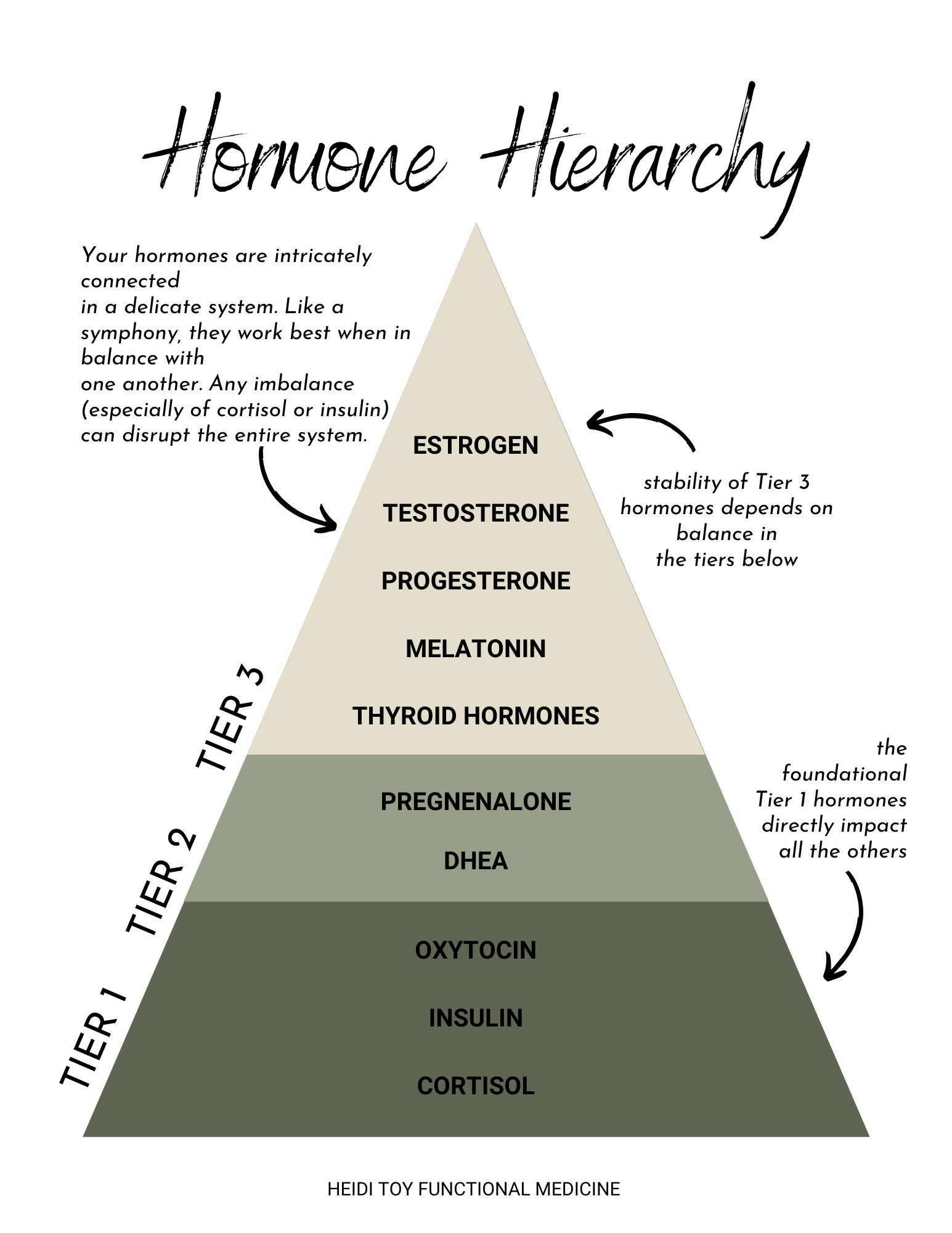The Hormonal Blueprint: Understanding Your Body’s Priority Systems
Hormones. The Hot Topic for Men + Women

When a client first comes to me seeking hormone balance, they usually want to focus on fixing their sex hormones—and while that might seem like the logical starting point, here’s the truth: sex hormones don’t just go out of balance on their own.
There’s always an underlying hierarchy at play in the hormone balancing process. Let’s break it down.
The main player?
Cortisol.
This vital hormone, produced by your adrenal glands, is essential for your stress response. But here’s the thing: if it gets out of balance, it has a domino effect on everything.
🌟 Cortisol regulates other hormones like insulin, thyroid hormones, and even oxytocin. Think of it like your body’s “stress manager.”
💡 If you struggle with weight, fatigue, or hormone imbalances, it might not just be diet-related. Stress could be a hidden driver—affecting cortisol levels, which, in turn, throw off other hormonal functions.
For example:
💥 Low thyroid function?
💥 Weight loss resistance?
💥 Brain fog & fatigue?
It’s time to look beyond diet and dig deeper into
cortisol balance.
The Root Cause of Hormonal Chaos
Hormones act out for two main reasons:
1️⃣ Diet—what we eat (or don’t eat).
2️⃣ Stress—how we manage our nervous system & cortisol.
Many people focus solely on dietary changes, and while that’s powerful, it won’t heal your body completely unless you address stress and nervous system health, too.
Here’s the truth: Stress impacts gut health, hormone balance, and so much more.
So how do you rebalance your body from the inside out?
✨ It starts with regulating cortisol—your foundational hormone.
Top 6 Tips to Balance Your Cortisol & Support Hormonal Health:
1️⃣ Hydrate, Hydrate, Hydrate 💧
Dehydration can increase cortisol levels, so staying hydrated is key to keeping stress hormones in check.
👉 Aim for at least 8-10 glasses of water daily and add electrolytes if needed, especially if you’re active.
2️⃣ Set Boundaries 🚦
Boundaries are more than just saying "no" to overcommitments—they're about creating structure in your daily life.
👉 Eat 3 balanced meals a day, spacing them 2-3 hours apart.
👉 Prioritize sleep by creating a consistent bedtime routine.
3️⃣ Reset Your Diurnal Clock ☀️🌙
Your body craves rhythm, and exposure to natural light can help reset your internal clock.
👉 Get morning sunlight on your face to energize your system (no sunglasses!).
👉 Watch the sunset or step outside at dusk to signal your body it’s time to wind down.
4️⃣ Adopt a Calming Routine 🧘♀️
Chronic stress keeps cortisol elevated, but calming practices can retrain your nervous system.
👉 Try 10 minutes of nightly meditation, deep breathing, or gentle stretching.
👉 Consistency is key—practice daily for the best results.
5️⃣ Exercise Regularly 🏋️♀️
Movement is medicine for your stress levels.
👉 Engage in daily activity, whether it’s walking, yoga, strength training, or cycling.
👉 Exercise reduces cortisol, improves mood, and enhances sleep quality.
6️⃣ Nourish Your Body 🥗
A well-balanced diet supports hormonal balance and reduces unnecessary cortisol spikes.
👉 Load up on whole foods—fruits, veggies, lean proteins, and healthy fats.
👉 Cut back on caffeine and refined sugar, which can overstimulate your adrenal glands.
💡 By implementing these six steps, you’re giving your body the structure it needs to thrive—and helping cortisol play its proper role in the hormone hierarchy!
Join the News Letter List or schedule a 1-on-1 consultation
I'm here to support you on your journey to hormonal balance and true healing.
Don't Miss Out!

Heidi Toy Functional Medicine Blog





















































































